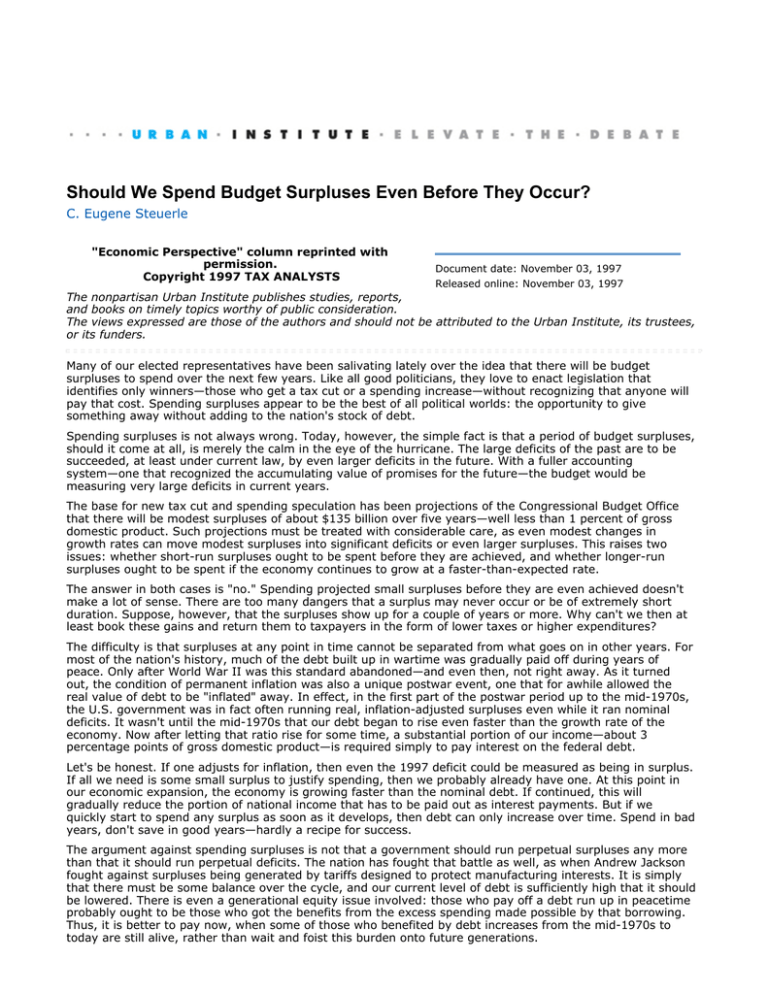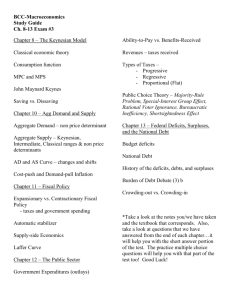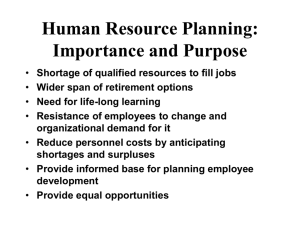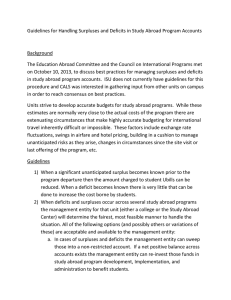Should We Spend Budget Surpluses Even Before They Occur?
advertisement

Should We Spend Budget Surpluses Even Before They Occur? C. Eugene Steuerle "Economic Perspective" column reprinted with permission. Copyright 1997 TAX ANALYSTS Document date: November 03, 1997 Released online: November 03, 1997 The nonpartisan Urban Institute publishes studies, reports, and books on timely topics worthy of public consideration. The views expressed are those of the authors and should not be attributed to the Urban Institute, its trustees, or its funders. Many of our elected representatives have been salivating lately over the idea that there will be budget surpluses to spend over the next few years. Like all good politicians, they love to enact legislation that identifies only winners—those who get a tax cut or a spending increase—without recognizing that anyone will pay that cost. Spending surpluses appear to be the best of all political worlds: the opportunity to give something away without adding to the nation's stock of debt. Spending surpluses is not always wrong. Today, however, the simple fact is that a period of budget surpluses, should it come at all, is merely the calm in the eye of the hurricane. The large deficits of the past are to be succeeded, at least under current law, by even larger deficits in the future. With a fuller accounting system—one that recognized the accumulating value of promises for the future—the budget would be measuring very large deficits in current years. The base for new tax cut and spending speculation has been projections of the Congressional Budget Office that there will be modest surpluses of about $135 billion over five years—well less than 1 percent of gross domestic product. Such projections must be treated with considerable care, as even modest changes in growth rates can move modest surpluses into significant deficits or even larger surpluses. This raises two issues: whether short-run surpluses ought to be spent before they are achieved, and whether longer-run surpluses ought to be spent if the economy continues to grow at a faster-than-expected rate. The answer in both cases is "no." Spending projected small surpluses before they are even achieved doesn't make a lot of sense. There are too many dangers that a surplus may never occur or be of extremely short duration. Suppose, however, that the surpluses show up for a couple of years or more. Why can't we then at least book these gains and return them to taxpayers in the form of lower taxes or higher expenditures? The difficulty is that surpluses at any point in time cannot be separated from what goes on in other years. For most of the nation's history, much of the debt built up in wartime was gradually paid off during years of peace. Only after World War II was this standard abandoned—and even then, not right away. As it turned out, the condition of permanent inflation was also a unique postwar event, one that for awhile allowed the real value of debt to be "inflated" away. In effect, in the first part of the postwar period up to the mid-1970s, the U.S. government was in fact often running real, inflation-adjusted surpluses even while it ran nominal deficits. It wasn't until the mid-1970s that our debt began to rise even faster than the growth rate of the economy. Now after letting that ratio rise for some time, a substantial portion of our income—about 3 percentage points of gross domestic product—is required simply to pay interest on the federal debt. Let's be honest. If one adjusts for inflation, then even the 1997 deficit could be measured as being in surplus. If all we need is some small surplus to justify spending, then we probably already have one. At this point in our economic expansion, the economy is growing faster than the nominal debt. If continued, this will gradually reduce the portion of national income that has to be paid out as interest payments. But if we quickly start to spend any surplus as soon as it develops, then debt can only increase over time. Spend in bad years, don't save in good years—hardly a recipe for success. The argument against spending surpluses is not that a government should run perpetual surpluses any more than that it should run perpetual deficits. The nation has fought that battle as well, as when Andrew Jackson fought against surpluses being generated by tariffs designed to protect manufacturing interests. It is simply that there must be some balance over the cycle, and our current level of debt is sufficiently high that it should be lowered. There is even a generational equity issue involved: those who pay off a debt run up in peacetime probably ought to be those who got the benefits from the excess spending made possible by that borrowing. Thus, it is better to pay now, when some of those who benefited by debt increases from the mid-1970s to today are still alive, rather than wait and foist this burden onto future generations. Most important, the government today is committed to paying out huge amounts of money once the baby boomers begin to retire. Some of these excessive obligations may be avoided through benefit reductions such as later retirement ages for social security. But an aging population inevitably is going to put some additional strains on the system if for no other reason than the very old—those demanding large amounts of medical care and nursing home care—will eventually rise significantly as a portion of the population. By running some surpluses now, we reduce the pressure of the interest burden—thus making it easier to accommodate these future needs and minimizing the tax increases that might otherwise be required. If one were able to count merely the annual increase in obligations being incurred by government, it would amount to hundreds of billions of dollars. Taking into account the accrual of liabilities would reveal more clearly than ever that we are running deficits, not surpluses, at the current time. What makes the current annual deficit measure so misleading is that the current ranks of the elderly are being filled by a baby bust population even while the baby boomers occupy much of the labor force. When the baby boomers begin to retire, they will be replaced in the labor force by another baby bust population. It is this demographic cycle that explains why the current budget reprieve can be likened to sitting in the eye of a hurricane—between the blasts of recent past deficits and the upcoming swirl of deficits associated with the projected large increase in retirees looking for support. Finally, the projected modest surpluses under current law do not take into account any emergency at all, foreign or domestic. Even if we must spend additional money, we should not do so frivolously, but rather retain some ability to respond to future needs as they arise. There is almost no good reason to spend projected surpluses at this point in time; there are a lot of good reasons to pay off some of our debt if we are lucky enough to continue to benefit from an expanding economy. Other Publications by the Authors C. Eugene Steuerle Usage and reprints: Most publications may be downloaded free of charge from the web site and may be used and copies made for research, academic, policy or other non-commercial purposes. Proper attribution is required. Posting UI research papers on other websites is permitted subject to prior approval from the Urban Institute—contact publicaffairs@urban.org. If you are unable to access or print the PDF document please contact us or call the Publications Office at (202) 261-5687. Disclaimer: The nonpartisan Urban Institute publishes studies, reports, and books on timely topics worthy of public consideration. The views expressed are those of the authors and should not be attributed to the Urban Institute, its trustees, or its funders. Copyright of the written materials contained within the Urban Institute website is owned or controlled by the Urban Institute. Source: The Urban Institute, © 2012 | http://www.urban.org








